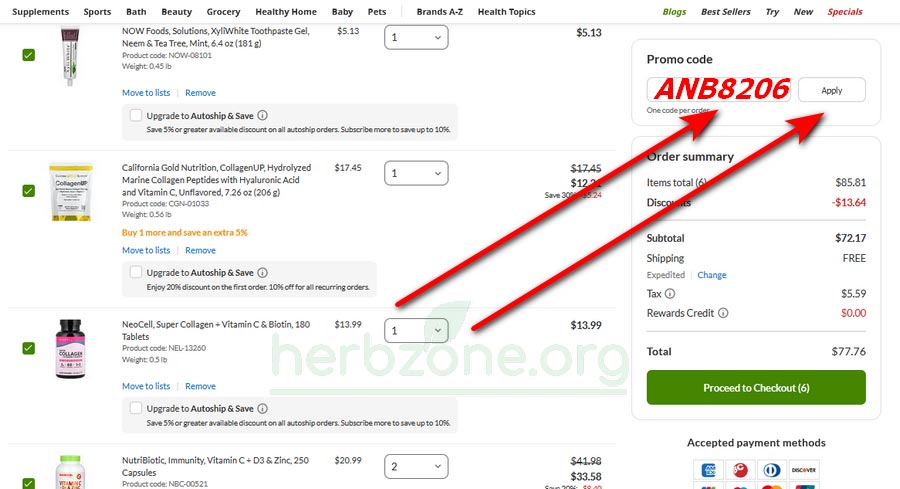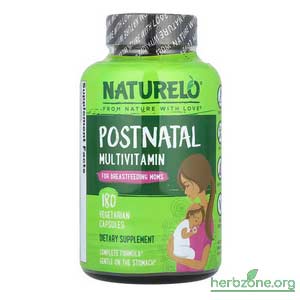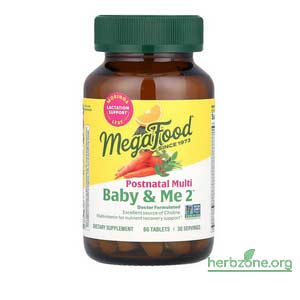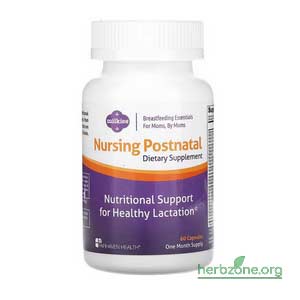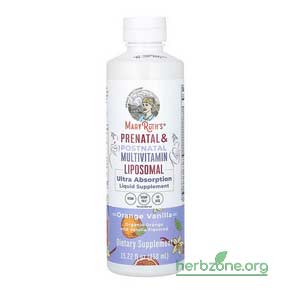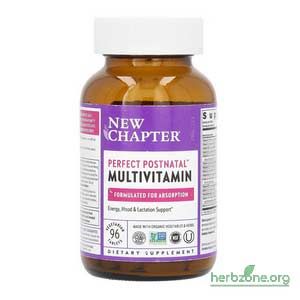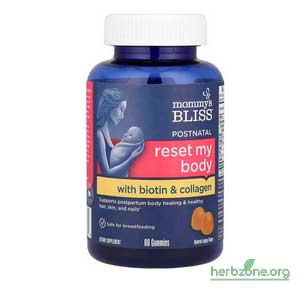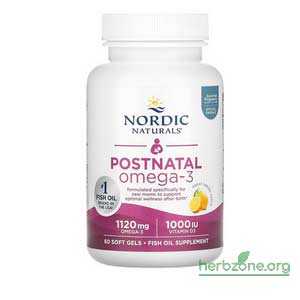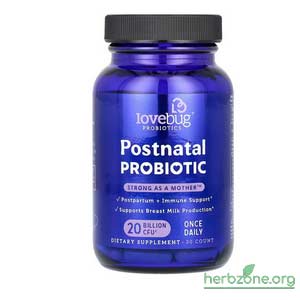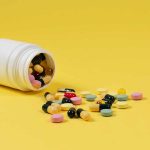Everyone knows that breastfeeding is the best way to provide a baby with essential nutrients. However, this is also a period of increased nutritional demands for the mother. During lactation, nutrients are used up in large quantities, making it crucial to replenish them after childbirth. That’s why it’s important to pay attention to the vitamins and minerals that should be included in a woman’s diet. In this article, together with Herbzone, we will explore vitamins for breastfeeding mothers, which nutrients they need, in what amounts, and how to choose them correctly.
In This Article:
- Vitamins for Breastfeeding Women: Daily Requirements
- Symptoms of Vitamin Deficiency in Breastfeeding Women
- Hair Loss During Breastfeeding: Causes, Prevention Tips
- How to Ensure Proper Vitamin Intake During Lactation
- Four Tips for Choosing Vitamins for Nursing Mothers
- Additional Health & Wellness Tips for Nursing Mothers
- The Best Vitamins for Nursing Mothers on iHerb: Top 8
Vitamins for Breastfeeding Women: Daily Requirements
To keep both mother and baby healthy, it’s essential to ensure an adequate intake of key vitamins and minerals. They help the mother cope with energy demands during this period and provide the baby with everything needed for growth and development.
Below is the daily requirement of essential vitamins and minerals for women during lactation (with recommended dosages).
1. Vitamin D
Vitamin D plays a crucial role in maintaining bone health, as it aids in calcium absorption.
How much vitamin D does a breastfeeding mother need? Women during lactation should get 400–600 IU of vitamin D per day, as its deficiency can affect both the mother and the baby.
2. B Vitamins
- Vitamin B12 – especially important for mothers following a vegetarian or vegan diet. It supports the nervous system and energy production.
- Folic acid (B9) – maintains blood health and reduces the risk of anemia.
3. Calcium
Breastfeeding mothers lose a significant amount of calcium, which is used for the baby’s bone development.
Daily requirement: ~1000 mg.
4. Iron
After childbirth, a mother’s iron levels may be reduced. Deficiency leads to fatigue and weakness.
Daily requirement: 9–10 mg.
5. Omega-3 Fatty Acids (DHA)
DHA (docosahexaenoic acid) supports the baby’s brain and vision development. It can be obtained from fatty fish or supplements.
6. Iodine
Iodine is essential for the normal function of the thyroid gland in both mother and baby.
Recommended daily intake: 250 mcg.
7. Vitamin C
Supports immune health and iron absorption. Sufficient amounts can be obtained from citrus fruits, kiwi, or supplements.

Symptoms of Vitamin Deficiency in Breastfeeding Women
Vitamin deficiencies during breastfeeding can manifest in different ways, depending on which nutrients are lacking. Below are the key deficiency symptoms:
1. Vitamin D Deficiency
- Chronic fatigue and weakness
- Muscle and joint pain
- Bone issues (brittleness or pain)
- Weakened immune system
2. B Vitamin Deficiency
- Vitamin B12:
- Weakness, fatigue
- Numbness or tingling in the limbs
- Poor concentration, forgetfulness
- Folic Acid (B9):
- Anemia (weakness, dizziness)
- Skin problems (rash, paleness)
- Irritability, mood swings
3. Calcium Deficiency
- Brittle nails, hair, and teeth
- Muscle cramps, especially in the legs
- Increased bone fragility
4. Iron Deficiency
- Persistent fatigue, weakness
- Dizziness, rapid heartbeat
- Pale skin and mucous membranes
- Shortness of breath even with mild exertion
5. Omega-3 (DHA) Deficiency
- Memory and concentration problems
- Dry skin
- Low mood or depression
6. Iodine Deficiency
- Constant fatigue
- Thyroid issues (swelling, difficulty swallowing)
- Reduced focus and mental clarity
7. Vitamin C Deficiency
- Frequent colds and slow recovery
- Bleeding gums
- Dry skin, fragile capillaries
If you notice any of these symptoms, it’s important to consult a doctor. They can help determine possible causes and recommend the necessary vitamin supplements or dietary adjustments.

Hair Loss During Breastfeeding: Causes, Prevention Tips
After childbirth, many women experience significant hair loss, which can last for several months. Let’s explore the main causes of this phenomenon, ways to prevent it, and nutrition and vitamin recommendations to help maintain healthy hair.
Why Does Hair Fall Out During Breastfeeding?
The primary cause of postpartum hair loss is hormonal changes in the body. During pregnancy, estrogen levels rise, which helps halt the natural hair shedding cycle. After childbirth, estrogen levels drop rapidly, and the hair that remained in the growth phase starts to fall out actively. This process is known as telogen effluvium and is a normal physiological reaction.
Additionally, other factors can worsen hair condition during lactation:
- Postpartum stress and fatigue
- Lack of sleep
- Vitamin and mineral deficiencies
- Poor nutrition
How to Prevent Hair Loss?
While it’s impossible to completely stop postpartum hair loss, you can significantly reduce its intensity with these tips:
1. Proper Hair Care
- Use mild shampoos and conditioners that strengthen hair.
- Avoid heat styling (blow dryers, straighteners).
- Apply nourishing hair masks.
2. Relaxation and Rest
- Try to reduce stress and find time to rest.
- Practice relaxation techniques like yoga or meditation.
3. Scalp Massage
- Regular massage improves blood circulation and strengthens hair follicles.

What Nutrition and Vitamins Support Hair Health?
A balanced diet and adequate nutrient intake play a crucial role in maintaining healthy hair. It is recommended to include the following in your diet:
1. Proteins
- Hair is primarily made of keratin, a protein, so consuming enough meat, fish, eggs, and legumes is essential.
2. Omega-3 Fatty Acids
- Nourish the scalp and hair.
- Sources: Fatty fish (salmon, mackerel), nuts, flaxseed oil.
3. Iron
- A deficiency can lead to weakness and hair loss.
- Sources: Red meat, spinach, buckwheat.
4. Vitamin D
- Promotes hair growth and prevents brittleness.
- Sources: Sunlight, fish oil, vitamin supplements.
5. B Vitamins (especially B7 – Biotin)
- Strengthen hair and stimulate growth.
- Sources: Eggs, nuts, whole grains.
6. Zinc and Selenium
- Support scalp health.
- Sources: Pumpkin seeds, seafood.
7. Vitamin C
- Aids iron absorption and stimulates hair growth.
- Sources: Citrus fruits, kiwi, berries.

How to Ensure Proper Vitamin Intake During Lactation
A well-balanced diet is key to supplying the body with essential vitamins. However, during breastfeeding, a woman may have increased nutritional needs, which can sometimes be difficult to meet through food alone. In such cases, specialized supplements for breastfeeding mothers can be helpful.
- Balanced diet – The diet should include vegetables, fruits, grains, protein sources (meat, fish, eggs), and dairy products.
- Vitamin supplements – If obtaining all necessary nutrients from food is challenging, a doctor may recommend specialized multivitamins for nursing mothers. Read more about the best supplements for breastfeeding moms in the next section.
- Regular check-ups – Monitoring blood tests can help detect deficiencies early and prevent their consequences.

Four Tips for Choosing Vitamins for Nursing Mothers
Choosing the right vitamin supplements is a crucial step in maintaining the health of both mother and baby. First and foremost, consult your doctor, who can help select the most suitable complex. It is also important to choose products that have undergone quality checks and hold the necessary certifications.
- Choose supplements specifically designed for nursing mothers.
- Check the composition: it should include essential vitamins and minerals (D, B12, iron, calcium, iodine).
- Prioritize reputable brands with good reviews.
- Avoid supplements with excessive vitamin doses, as they can be harmful.
Additional Health & Wellness Tips for Nursing Mothers
During breastfeeding, a woman’s body undergoes significant changes, making it essential to maintain a proper nutrient balance. Special attention should be given to hydration, quality nutrition, and adequate rest. Following these simple guidelines will help preserve energy and overall well-being.
- Water intake increases during breastfeeding, so ensure you stay hydrated.
- Avoid taking high doses of vitamins without consulting a doctor.
- Pay attention to your well-being: fatigue, skin, hair, or nail problems may indicate nutrient deficiencies.

The Best Vitamins for Nursing Mothers on iHerb: Top 8
Below is a selection of top-rated multivitamin complexes for nursing mothers available on iHerb, along with omega-3 and probiotics for postpartum recovery.
Naturelo, Postnatal Multivitamin for Breastfeeding Moms, 180 Vegetarian Capsules
Description: A multivitamin complex for women during breastfeeding, containing natural ingredients such as organic herbs and vegetable extracts, along with key vitamins and minerals to support energy, immunity, and hair, skin, and nail health.
Reviews: Users highlight the product’s high quality, natural composition, and positive impact on overall well-being.
MegaFood, Baby & Me 2, Postnatal Multi, 60 Tablets
Description: Natural postnatal multivitamins designed to support the health of both mother and baby. Contains iron, vitamin D3, iodine, and folic acid.
Reviews: Women praise this product for its organic composition and lack of side effects. It is particularly valued for boosting energy and aiding postpartum recovery.
Fairhaven Health, Milkies, Nursing Postnatal, 60 Capsules
Description: A formula enriched with DHA, vitamins D and B6 to support breastfeeding and overall maternal health.
Reviews: Buyers report improved lactation and overall well-being after taking these capsules.
MaryRuth’s, Prenatal & Postnatal Multivitamin, Liposomal, Orange Vanilla, 450 ml
Description: A liquid multivitamin complex for pregnant and nursing mothers with a pleasant orange-vanilla flavor. Supports energy, immunity, and overall health.
Reviews: Users appreciate the convenient format, pleasant taste, and fast-acting benefits.
New Chapter, Perfect Postnatal Multivitamin, 96 Vegetarian Tablets
Description: Vegetarian postnatal multivitamins enriched with fermented herbs to support energy, mood, and lactation.
Reviews: Women report improved well-being and praise the natural composition without synthetic additives.
Additional Supplements for Nursing Mothers
Mommy’s Bliss, Postnatal Reset, My Body, with Biotin & Collagen, Natural Lemon, 60 Gummies
Description: Chewable gummies with biotin and collagen for postpartum recovery. Supports skin, hair, and nail health while maintaining hormonal balance.
Reviews: Consumers love the pleasant taste and noticeable improvements in their appearance and well-being.
Nordic Naturals, Postnatal Omega-3, Lemon, 60 Soft Gels
Description: A source of omega-3 enriched with DHA and EPA to support brain function, vision, and heart health. Helps mothers stay energized and reduce postpartum fatigue.
Reviews: Users appreciate the clean composition, easy-to-swallow capsules, and positive effects on concentration and mood.
LoveBug Probiotics, Postnatal Probiotic, 20 Billion CFU, 30 Count
Description: A probiotic designed to support digestion and immunity in nursing mothers. Aids in gut microbiome restoration and nutrient absorption.
Reviews: Women report improved digestion and overall well-being after taking this supplement.
Final Thoughts
Supporting a nursing mother’s health is an investment in the baby’s well-being. A balanced diet, necessary vitamin supplements (if needed), and regular health check-ups will ensure the body receives everything it needs. Keep in mind that every mother is unique, so always consult a doctor before taking supplements.
Use the iHerb promo code ANB8206 and get discounts from 5% to 30% on all your orders.
This promo code has no restrictions and applies to every purchase!
